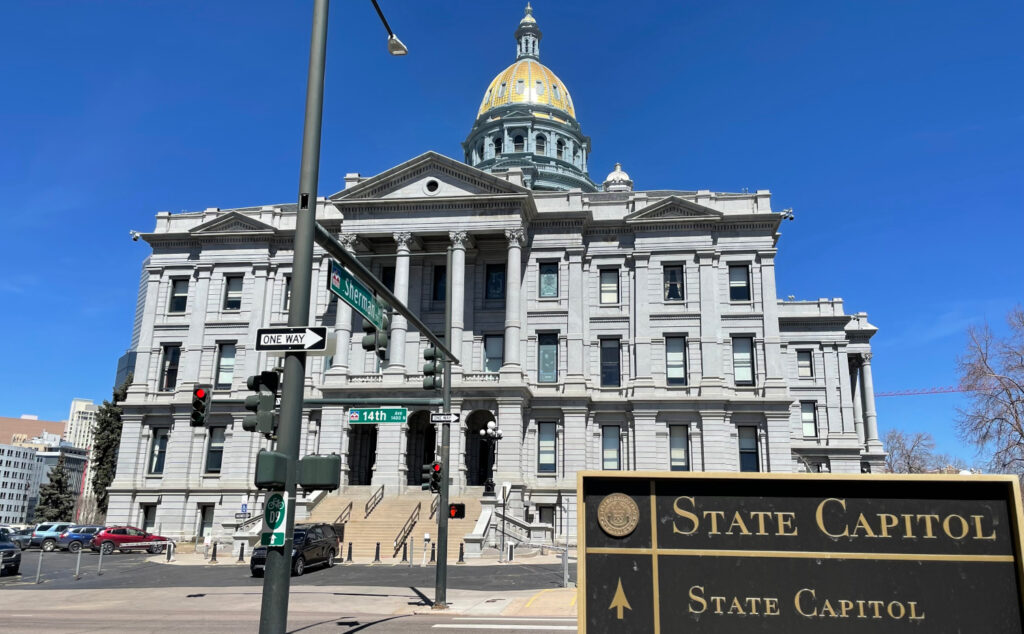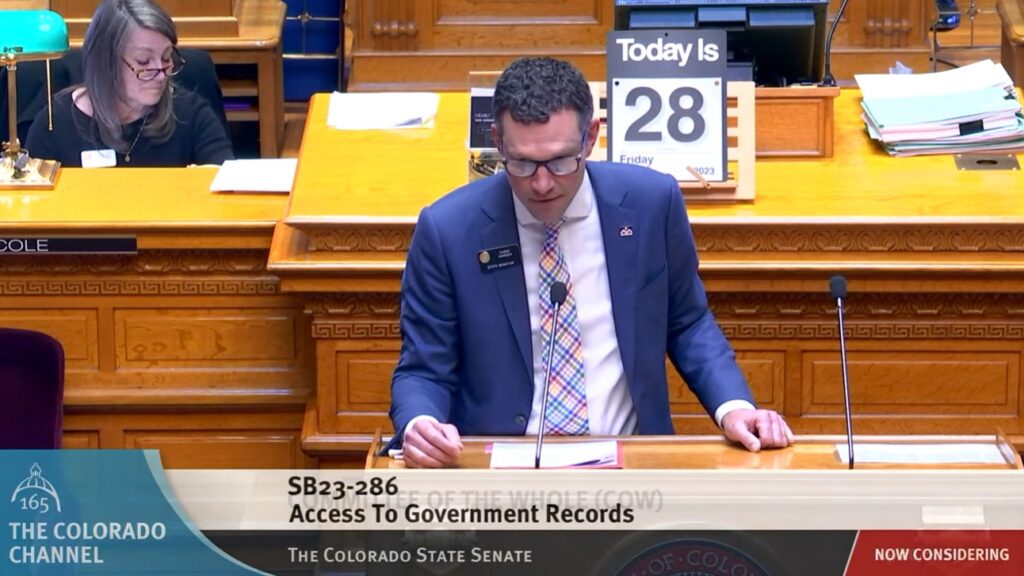Update: Gov. Jared Polis vetoed HB 23-1259, the executive sessions bill, on Tuesday, June 6.
By Jeffrey A. Roberts
CFOIC Executive Director
Despite a looming inflationary increase in fees, state lawmakers in the 2023 legislative session never addressed the often-high cost of obtaining public records in Colorado but did vote to eliminate some nagging obstacles for users of the Colorado Open Records Act.
Senate Bill 23-286, which passed on the General Assembly’s final day Monday, prohibits state agencies and local governments from requiring requesters to show identification to get CORA records. It obligates records custodians to accept credit cards or electronic payments for records if they already take them for other products and services, and it bars per-page charges for records provided in digital formats such as PDFs.

Concerning government transparency, freedom-of-information and First Amendment issues, the legislature likewise passed a bill restricting the government’s use of non-disclosure agreements and it approved measures to allow more scrutiny of the judicial branch, including a bill requiring the livestreaming of criminal court proceedings.
But lawmakers also voted to let themselves and other state-and-local elected officials block anyone on their private social media accounts for “any reason.” The majority Democratic House and Senate caucuses continued to use a secret-ballot system to help decide the fate of bills requiring state funding. And the Colorado Freedom of Information Coalition had to persuade legislators not to weaken Coloradans’ ability to challenge inadequately announced executive sessions convened by school boards and other local public bodies.
CFOIC had hoped the CORA bill would curb the fees government entities can charge to process records requests, especially after an expected bill on this topic never materialized in 2022. We’ve sounded the alarm about expensive CORA charges for years and pointed out last summer that soaring inflation could boost the maximum hourly research-and-retrieval rate — currently $33.58 — to $40 or more when Legislative Council recalculates it on July 1, 2024, as the law requires.
Although CFOIC and the Colorado Press Association tried to interest lawmakers in CORA cost relief, there was considerable opposition from government lobbyists to changing the law’s current fee structure. Sen. Chris Hansen, the Denver Democrat who introduced SB 23-286, floated a version that gave news media a break on fees and governments more time to respond to many records requests — but that language didn’t make it into the introduced or final bill.
The CORA bill, as it heads to the governor’s desk, includes a few other provisions besides those concerning per-page charges for electronic records, IDs and credit card payments:
- Making public the results of investigations into sexual harassment complaints against elected officials “if the investigation concludes that the elected official is culpable.” The identities of accusers, victims and witnesses must be redacted from the records.
- Requiring each member of the legislature, the governor’s office and each state agency and institution to submit reports by Jan. 1, 2024, outlining their email retention policies.
- Requiring records custodians to transmit digital public records to requesters by email “or another mutually-agreed-upon transmission method.” A records custodian may not convert a digital public record into a non-searchable format before transmission.
- Allowing records custodians to withhold email addresses, phone numbers and home addresses provided by a person to an elected official or a government entity.

Under the ID provision in SB 23-286, record custodians could still make requesters show identification for records that are confidential under CORA or available only to a “person in interest.” The provision does not affect law enforcement agencies, many of which require requesters to show driver’s licenses to obtain records open for inspection under the Colorado Criminal Justice Records Act. The credit-card provision also does not apply to law enforcement agencies.
Republican Sen. Barbara Kirkmeyer of Brighton proposed an unsuccessful CORA bill amendment to open records on the Democrats’ use of the anonymous “quadratic voting” system to prioritize legislation affecting the state budget. Saying the system violates the Colorado Open Meetings Law, Kirkmeyer echoed arguments made by CFOIC in a letter sent to legislative leaders last fall.
Here is a roundup of other 2023 government transparency, freedom-of-information, First Amendment and press-related bills tracked by CFOIC:
Executive sessions. House Bill 23-1259 as introduced would have allowed school boards and other local public bodies to “cure” an inadequately announced closed-door meeting at a subsequent meeting, and anyone who unsuccessfully challenged an executive session announcement in court would have been liable for the government’s court costs and attorney fees. The measure was aimed at thwarting a Pagosa Springs lawyer who has represented himself in 46 open-government lawsuits over the past three years, often settling for amounts of about $3,000.
CFOIC argued the bill diminished local government transparency and created a risky financial barrier for anyone interested in filing an accountability lawsuit over whether a local public body announced a closed-door meeting with enough specificity. Eventually, we persuaded lawmakers to rewrite the measure, leaving only a provision that bars pro se litigants who challenge the legality of executive sessions — like the Pagosa Springs lawyer — from collecting legal fees if they prevail in court.
Juvenile records. Senate Bill 23-075, which passed the legislature Saturday, requires the deletion of all juvenile victim and witness names from law enforcement and court records — except for records that solely involve traffic offenses — before the records are released to the public. An amendment permits a news organization or anyone else to argue in court for the disclosure of the name of a child victim or witness — but only if they can show “that the public interest in accessing the name and identifying information … substantially outweighs the harm to the privacy interest of the child victim, child witness” or their legal guardians.
Courts livestreaming. House Bill 23-1182, which passed the legislature May 2, requires the livestreaming of criminal court proceedings on Webex or another videoconferencing platform. Unlike a chief justice directive that goes into effect May 15, the bill presumes that criminal trials and evidentiary hearings held in open court will be livestreamed. The measure lets a judge limit livestreaming after finding it would likely compromise a person’s safety, a defendant’s right to a fair trial or a victim’s rights and “there is no less restrictive alternative that preserves the public interest in remote observation while mitigating the identified risk.”
Social media. House Bill 23-1306, which passed May 4, lets an elected official block anyone from their private social media for bullying, harassment, intimidation “or any reason” and is believed to be the first such measure approved by a state legislature.
The bill’s sponsors said it is in line with Lindke v. Freed, one of two U.S. Court of Appeals rulings that will be reviewed by the U.S. Supreme Court. But Catherine Ordoñez, policy counsel for the American Civil Liberties Union of Colorado, said “legislators following the text of this bill will regularly violate the First Amendment rights of the individuals interacting with their social media accounts, producing more litigation.”
If a private account is used for official purposes, “you can’t exclude people from that public forum based on their viewpoints,” Katie Fallow, senior counsel at Columbia University’s Knight First Amendment Institute, told CFOIC.
Non-disclosure agreements. Senate Bil 23-053, Kirkmeyer’s second attempt at barring the use of confidentiality agreements by state agencies and local governments, followed a November 2022 Denver Gazette investigation showing that Colorado has increasingly required employees to sign non-disclosure clauses in financial settlements they make with the state.
The bill, which passed May 2, includes some exceptions to prevent the public release of trade secrets, personal identifying information and other confidential information. “I’m hopeful that this will end the current culture of secrecy and encourage a new era of greater openness and honesty,” attorney Casey Leier, who represents public employees, told The Gazette.
Judicial discipline. The legislature passed three measures, House Concurrent Resolution 23-1001, House Bill 23-1019 and House Bill 23-1205 that overhaul the way judges are disciplined. One provision requiring voter approval would the formal filing of discipline and the hearing process public.
Access to government. House Bill 23-1308, aimed at improving access to government for people with disabilities, died at the request of sponsoring Rep. David Ortiz, D-Centennial, but he promised to bring up a broader proposal next session. Among other provisions, the bill would have mandated the livestreaming and recording of public body meetings and required public bodies to post on their websites “any documents that will be distributed or discussed during a public meeting” at least seven days before the meeting or as soon as practicable before the meeting.
Follow the Colorado Freedom of Information Coalition on Twitter @CoFOIC. Like CFOIC’s Facebook page. Do you appreciate the information and resources provided by CFOIC? Please consider making a tax-deductible donation.




